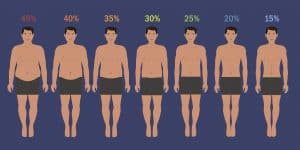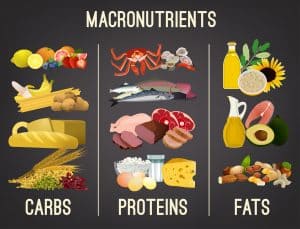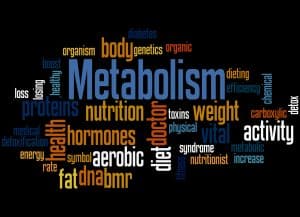This article is for lifters who train hard!
For those who take lifting and bodybuilding seriously and want to build lean muscle mass at an optimal state.
If you are one (good for you by the way), keep reading.
Because you’re about to learn how, when, and what to eat to maximize your muscle gaining potential.
Does Nutrition Timing Matter for Muscle Gain?
Of course, it does!
But only if your training sessions are intense.
If you go to the gym to lift 3 sets of 10 reps, 3 days a week. Then probably nutrition timing won’t matter for you.
With that out of the way, let’s explain in detail how nutrition timing is important for gaining muscle.
But first, let’s start by introducing three important concepts …
Muscle protein balance, Energy Phase, and Anabolic Window.
Muscle Protein Balance
Muscle Protein balance is the difference between two processes:
1- Muscle Protein Breakdown: This is the process in which amino acids that represent the building block of skeletal muscle fibers are lost especially during the workout and period of hunger.
2- Muscle Protein Synthesis: This is the process in which amino acids are gained from an external supply (food and supplementS) to build new muscle fibers.
The former is a catabolic process and the latter is anabolic.
Therefore, in order to build muscle fibers, muscle protein synthesis levels have to be higher than those of muscle protein breakdown.
Energy Phase
Energy phase is the phase that occurs during the workout when the muscles demand a high energy supply from the macronutrients.
The ATP (Adenosine triphosphate, a molecule that carries the energy) acquires the chemical energy from the broken down carbs, protein, and fats and delivers it to the muscle cells.
Thus the more intense your workouts are the higher the energy your muscles demand. This energy has to be supplied by the macronutrient intake or stored in the body.
During this phase, a series of anabolic and catabolic processes take place.
Anabolic processes include; an increase in growth hormone, testosterone, and GI levels, and an increase in muscle blood flow.
Catabolic processes include; a decrease in insulin levels, glycogen depletion, dehydration, and an increase in metabolism.
Anabolic Window
It is defined as the window 15- 60 mins after the workout during which your muscles reach optimal conditions for macronutrient absorption.
The anabolic window was scientifically shown to exist and not a myth as some lifters believe.
Although the research is far from conclusive, some studies show that the optimal state of protein ingestion and muscle protein synthesis happens at about 1 to 3 hours post-workout, as shown in the figure below.
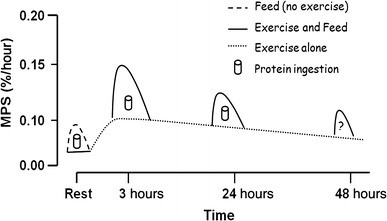
Anabolic window is a maximum at 1-3 hours post-workout, after which it starts to diminish but doesn’t completely close. (Phillips, 2014)
Nutrition Timing for muscle Gain - When and What to eat?
With these three concepts in mind: muscle protein synthesis, Energy phase, and anabolic window, let’s get into nutrition timing and what to eat to maximize muscle gain.
Pre-workout Nutrition Timing For Muscle Growth
The Energy Phase tells us that the muscle will demand higher energy during the workout. Thus, it is important to maximize the pre-workout nutrition opportunity.
About 1-2 hours pre-workout, consume a balanced meal that contains carbohydrates, protein, and some healthy fats.
For example:
- 20 grams of carbs.
- 20 grams of protein.
- 5-10 grams of fats.
The idea here is that carbohydrates increase insulin sensitivity which signals the pancreas to release more insulin.
Insulin helps break down the carbohydrates into glucose in the blood (sugar), this glucose becomes available to the muscle during the workout.
Adding some healthy fats will slow down the spike in insulin. This will help insulin levels to be elevated for a relatively longer time than in the case in which fats are absent.
Protein will help supply the muscle with the necessary amino acids.
Nutrition Timing During Workout For Muscle Growth
During the workout, the Energy Phase is maximum. Your muscle demands higher amounts of nutrients.
If your training sessions are intense, carbohydrates get depleted fast.
In this case, it is important that you don’t run out of nutrients during the workout. This is because your muscle will start to use its fibers (its own amino acids) as a source of energy, which leads to a catabolic effect.
In order to minimize muscle protein breakdown during the workout, you should consume pre-digested carbohydrates and essential amino acids (EAA), particularly Leucine, due to its ability to repair muscle fibers – a process called Leucine Trigger.
The fast-acting carbs (like Cluster Dextrin) will quickly replenish the depleted glycogen (carbs stored in the muscle) in the muscle and increase insulin sensitivity.
Because the skeletal muscle blood flow is maximum during the workout, glucose from carbohydrates will help open the muscle cell’s gates which accelerates the rush of nutrients into your muscle.
And when combined with amino acids, the fibers receive their building blocks from the external source (EAA supplement) in large amounts which will help reduce, or completely avoid, using their own amino acids for energy.
Muscle protein synthesis now is elevated.
Post-workout Nutrition Timing For Muscle Growth
About 1- 2 hours post-workout, and because the intra-workout is predigested carbs + EAA, it becomes critical to consume food, as you the post-workout anabolic window tells us.
You should consume another balanced meal that has carbohydrates, protein, and fats.
Replenishing carbohydrates is important to increase the glycogen in the muscle.
Say:
- 20 – 40 grams carbs.
- 20 – 40 grams protein.
- 10 – 20 grams fats.
In addition, post-workout protein intake is essential for repairing broken down muscle fibers and stimulating MPS.
It was shown, in some studies, that MPS is maximized 3-5 hours after digestion of the post-workout meal when combined with an intense workout, as in the figure below.
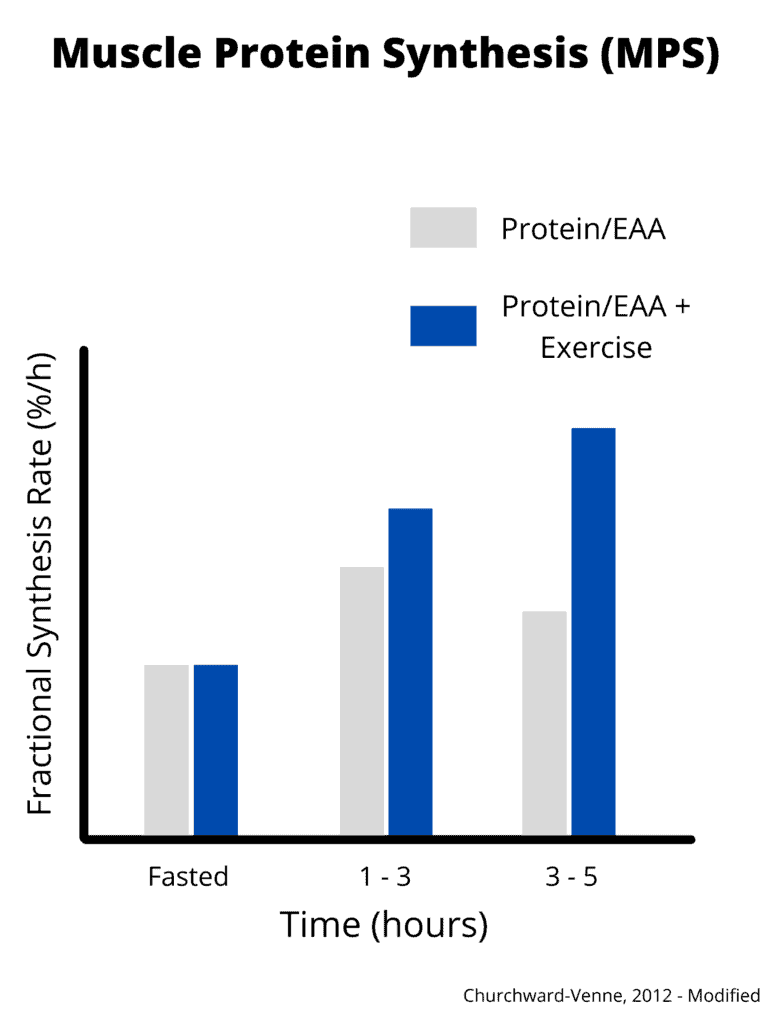
Increase in muscle protein synthesis (MPS) 1-3 hours after digestion of protein or essential amino acids (EAA). The maximum MPS happens 3-5 hours if protein intake is combined with the workout.
Whey protein isolate that has essential amino acids, Leucine, in particular, is ideal for this meal.
Nutrition Timing For Muscle Growth - Before Bed
Lacking protein supply for 6-8 hours of sleep will lead to muscle protein breakdown.
In this case, it is recommended that you consume a slow-digesting protein like Casein, and avoid whey or soy protein (fast digested). See (b) figure below.
Casein protein contains relatively lower amounts of Leucine compared to whey(highest) and soy protein ((a) in the figure, below).
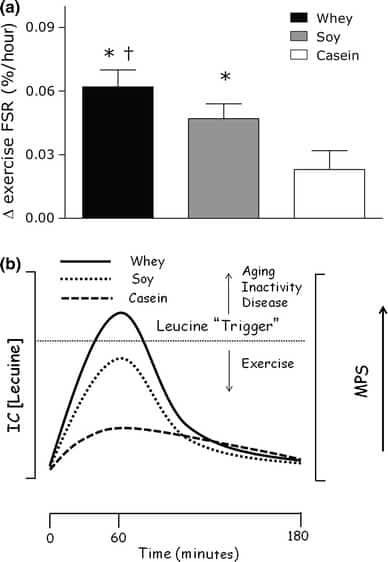
(a) Caseine protein contains less leucine and wherefore it’s less effective in MPS. (b) Casein protein is the slowest in digestion compared to whey and soy protein. (Phillips, 2014)
The addition of carbohydrates, especially high-glycemic carbs, also is not a bad idea at all. It helps you sleep better as some studies suggest.
It won’t affect your body’s fat since it is a function of total macros consumed in the day.








